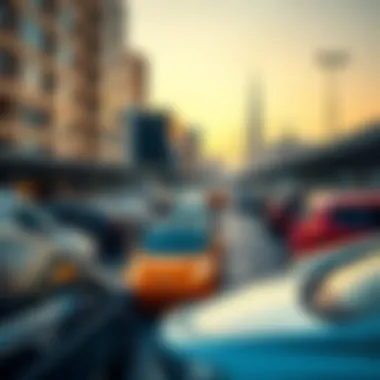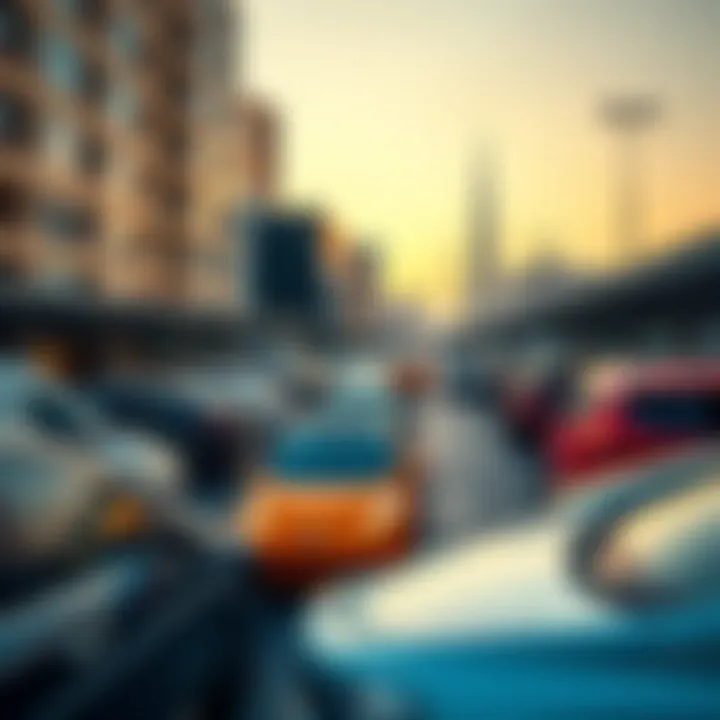Navigating Parking in Dubai: Regulations and Innovations


Intro
Parking in Dubai has become a vital aspect of urban life in this bustling metropolis. As the city continues to grow at a breakneck pace, the nuances of parking evolve alongside it. Residents and visitors alike often find themselves navigating a sea of regulations, options, and technologies that govern how they park their vehicles. From bustling shopping malls to the sand-swept streets of older districts, understanding the parking landscape in Dubai is crucial for making the most of your time in the city.
In this section, we will explore the current state of parking, highlighting essential regulations and facilities, as well as looking into the innovations helping to shape the future of this urban phenomenon. Both publicly managed and privately owned parking will be dissected to offer an in-depth view of the systems in place, and we’ll address some of the hurdles faced by those trying to secure a parking spot in the continually evolving environment of Dubai.
Overview of Parking in Dubai
Parking in Dubai represents a critical aspect of urban infrastructure, reflecting both the vibrancy and the complexities of life in this bustling metropolis. The sheer pace of development in Dubai has led to a unique parking scenario that is constantly evolving, with both opportunities and challenges interwoven. Understanding this landscape is essential not just for residents but also for investors, expatriates, and businesses grappling with parking regulations and facility availability.
Historical Context
Looking back, parking in Dubai has transitioned remarkably. In the early days, the demand for parking spaces did not match the growing number of vehicles on the road. As the city swiftly transformed from a small fishing village into a global economic powerhouse, the need for a structured approach to parking became apparent. Initially, the parking system resembled more of a patchwork solution, where informal arrangements ruled the day.
Over the past few decades, as urban planning gained momentum, government entities made conscious efforts to enhance parking infrastructures. New laws and policies were introduced to regulate parking spaces effectively, combatting issues such as congestion and ensuring efficient vehicular flow. It was a major shift from a casual, almost laissez-faire attitude toward parking towards a more systematic approach that sought to balance growth with accessibility.
Current Landscape
Today, the parking situation in Dubai is markedly improved, though not without its challenges. An extensive network of parking facilities exists across the city, including multi-storey parking garages and designated parking lots. More than just a place to shove a car, these facilities often come equipped with smart technology to manage space availability effectively.
Regulations governing street parking have also evolved. Signs indicating parking rules are clearly displayed, with smart meters increasingly commonplace, allowing payments via mobile apps. All this has considerably reduced the struggle for finding parking in dense urban environments, particularly in areas like the Dubai Marina and Downtown Dubai.
However, challenges remain. Despite the vast number of parking spaces, peak hours often result in congestion and a scarcity of accessible spots. This contradiction points to a city that dances on the edge of its own rapid expansion.
"As Dubai continues to grow and evolve, so does the intricate ballet of managing parking spaces amid a blend of tradition and technological advancement."
Accommodating the needs of special groups is another focus area, and certain parking facilities are designed to meet accessibility standards. This ensures that individuals with special needs have just as much access to the city’s amenities as anyone else.
In summary, understanding the overview of parking in Dubai leads to insights into how the city navigates its growth trajectory. Through historical context and current developments, one can grasp the nuances that affect daily commutes and urban living experiences.
Public Parking Facilities
Public parking facilities play a crucial role in the urban landscape of Dubai, a bustling metropolis characterized by its rapid expansion and vibrant economy. With a growing population and a steady influx of tourists, understanding the dynamics of public parking is essential for both residents and visitors alike. These facilities not only serve to accommodate the increasing number of vehicles but also reflect the city's commitment to urban planning and accessibility.
Parking Lots and Garages
Dubai boasts a diverse array of parking lots and garages, aimed at facilitating ease of access and mobility in the city. These facilities range from underground parking in high-end malls like The Dubai Mall to open-air lots near popular tourist destinations such as the Burj Khalifa.
A notable example is the multi-story parking garage at Mall of the Emirates, which offers over 7,000 parking spaces and incorporates smart parking technology to help drivers locate available spots quickly. Smart parking systems employ sensors that inform users through mobile applications and screens about real-time availability. This system reduces the hassle of circling around looking for parking, thereby cutting down on traffic congestion and vehicle emissions.
Moreover, public parking spaces often have designated payment methods, including ticket machines and mobile payment options, allowing for a seamless experience. However, factors such as location and demand often lead to full lots, especially during peak hours.
Street Parking Regulations
Alongside dedicated parking lots, understanding the regulations surrounding street parking in Dubai is vital for avoiding fines and ensuring compliance. Street parking tends to be limited in busy areas, and regulations vary significantly from one neighborhood to another. Most streets have specific time limits for parking, and signs indicating these restrictions are common.
For instance, in some districts, parking may be free during weekends and public holidays, while in others, paid parking is enforced 24/7. The Roads and Transport Authority (RTA) has implemented a system of colored parking zones, where each color represents different price levels and time restrictions. Failure to adhere to these regulations can result in hefty fines, so familiarity with local rules is essential.


"Understanding parking regulations is key to navigating Dubai’s vibrant streets effectively."
Accessibility for Special Needs
In recent years, Dubai has made significant strides in ensuring accessibility for individuals with special needs within public parking facilities. The city has established parking spaces that are specifically designed to cater to those with disabilities, providing closer access to public buildings and transport nodes.
These designated spots are typically wider, allowing for easier entry and exit from vehicles. It's important to note that special needs parking spots are enforced and require valid permits to avoid penalties. Furthermore, in many public places, accessibility is further enhanced through ramps and guides, ensuring that everyone has a smooth experience in navigating the city.
In sum, public parking facilities in Dubai, with their varied options and regulations, are designed to cater to the needs of a diverse population. Knowing the ins and outs of these facilities can ease the experience for both residents and transient visitors. As Dubai continues to develop, ongoing investments in public parking will only enhance the functionality and efficiency of urban mobility.
Private Parking Options
In a city as bustling as Dubai, private parking options are not just a luxury; they are a necessity. With the rapid urbanization and influx of residents and tourists, the demand for reliable and convenient parking solutions has never been higher. The significance of private parking lies in its ability to alleviate the strain on public facilities while providing a personalized experience for users. Investors, homebuyers, and expatriates, in particular, find value in understanding the intricacies surrounding these options.
Residential Complexes
Residential complexes in Dubai typically come equipped with dedicated parking spaces for residents. These parking facilities often vary according to the type of development and its location. In upscale areas like Dubai Marina or Downtown Dubai, you would find high-rise buildings featuring not just parking lots but also valet services and extensive security measures.
- Convenience: Living in a residential complex with parking readily available means less hassle. No need to circle the block or risk parking fines—a dedicated spot makes life easy.
- Security: Most complexes have surveillance systems, controlled access, and often a 24-hour concierge. This adds an extra layer of safety that can’t be overlooked, especially for families or expatriates new to the area.
- Real Estate Appeal: For investors and homebuyers, having off-street parking is a significant selling point. Properties with designated parking tend to have higher resale values and attract more interest from potential buyers.
However, it’s essential to consider factors like the size of the parking space and ease of access. Some newer developments are incorporating smart parking features, which allow residents to book their spots via mobile applications. This tech-savvy approach makes managing parking even simpler.
Commercial Establishments
When it comes to commercial establishments, parking options play a crucial role in customer satisfaction and retention. From shopping malls to office buildings, the ability to park conveniently can make or break a business.
- Customer Experience: Places like The Dubai Mall or Mall of the Emirates feature vast parking facilities, ensuring that visitors can find a spot without frustration. This enhances the overall shopping experience, pushing patrons to spend more time—and money.
- Business Operations: For businesses, especially those that require foot traffic, having adequate parking is paramount. Retailers may choose locations based on the availability of parking, realizing it directly affects sales.
- Leasing Opportunities: Commercial developers actually benefit from offering parking spaces in conjunction with their properties. Blanketing a retail space with parking availability can increase the property’s value and attract more tenants.
In contrast, some smaller businesses may struggle without dedicated parking, leading to creative solutions like partnerships with nearby facilities or offering incentives for public transport usage.
The dynamics of parking in Dubai are a reflection of its growth. Understanding these private options is essential for anyone navigating this vibrant city.
Technological Innovations in Parking
In the rapidly evolving landscape of Dubai, technological innovations in parking are becoming more than just a trend. They are slowly transforming how residents, visitors, and businesses navigate the complexities of parking management. These advancements are not only enhancing convenience but also addressing some of the city’s pressing parking challenges. The integration of technology into parking solutions offers considerable benefits, such as reducing congestion, increasing accessibility, and improving user experience.
Smart Parking Solutions
Smart parking solutions represent a leap forward in how parking resources are utilized. In Dubai, these systems leverage sensors and IoT (Internet of Things) technology to monitor parking spaces in real-time. This means drivers can receive instant updates on available spots, effectively making aimless cruising for a parking place a thing of the past.
The benefits are manifold:
- Increased Efficiency: By guiding drivers directly to available parking, the overall traffic flow improves, helping to alleviate congestion in busy areas.
- Data Insights: Smart systems collect valuable data that can be used by city planners to optimize parking infrastructure and address peak times effectively.
- Environmental Impact: Reduced emissions from vehicles idling in search of parking can contribute positively to air quality.
In short, smart parking solutions not only ease the search for parking but also provide a vital tool for urban planners to improve overall traffic management.
Mobile Apps and Navigation Tools


As the demand for improved parking solutions rises, mobile apps and navigation tools are carving out their niche by providing a user-friendly interface for finding and reserving parking spots. Applications such as Parkopedia and Dubai's RTA Smart Parking ensure that potential parkers' journey begins long before they reach their destination.
These tools typically offer features like:
- Real-Time Availability: Users can see current parking options based on their location, a critical feature for those heading into busy districts.
- Payment Integration: Many apps allow users to pay through their mobile devices, which streamlines the parking process, making it hassle-free to both find and pay for parking.
- User Ratings and Reviews: The collaborative nature of mobile applications enables users to review parking spots, providing insights that can help others make better choices.
Moreover, navigating through the labyrinth of Dubai’s streets becomes less daunting thanks to navigation tools that integrate parking options along with optimal routes, ultimately saving time.
"Enhancing the parking experience through app technology allows residents and visitors to focus more on what matters—the activities waiting for them rather than the parking struggles they face."
The integration of these technological advancements forms a crucial piece in the puzzle of efficient parking management in Dubai. As they gain traction, they not only pave the way for better parking solutions but also contribute to a more organized urban environment.
Environmental Considerations
Addressing Environmental Considerations is crucial in the context of parking in Dubai, a growing metropolis that is balancing rapid urbanization with the need for sustainable practices. The way parking spaces are designed and managed directly affects the overall environmental footprint of the city. This section will delve into two main aspects: sustainability efforts and the impact of urbanization on parking management.
Sustainability Efforts
Sustainability initiatives in Dubai's parking management are becoming increasingly evident as the government seeks to create a greener urban environment. Various programs aim to reduce emissions and enhance energy efficiency. Here are some notable efforts:
- Green Parking: The concept of green parking involves minimizing the ecological impact of parking facilities. Incorporating elements like permeable paving, which allows rainwater to seep through and recharge the groundwater is a growing trend. This design reduces runoff and supports local ecosystems.
- Solar-Powered Lighting: Many parking areas are adopting solar-powered lighting systems. This significantly cuts down on electricity consumption and reduces carbon emissions. Moreover, it aligns with the broader goals of the UAE to harness renewable energy sources.
- Electric Vehicle Charging Stations: As electric vehicles become more common, parking facilities in Dubai are increasingly equipped with charging stations. This not only encourages electric vehicle use but also promotes environmental responsibility among drivers.
In tandem with these efforts, the city offers incentives for businesses and developers who adopt eco-friendly parking solutions. A viable example is the Dubai Green Building Regulations that encourage sustainable construction practices across the board, including parking areas.
Impact of Urbanization
The rapid urbanization in Dubai presents both challenges and opportunities in parking management. With an increasing population and an influx of visitors, the city faces a growing demand for parking spaces. Here’s how urbanization influences parking:
- Increased Demand: As people flock to this vibrant city for jobs and leisure, the necessity for ample parking grows. The traditional parking models often struggle to catch up with this high demand, leading to congestion and frustration among drivers.
- Mixed-Use Developments: Urbanization is prompting the emergence of mixed-use developments, where residential, commercial, and recreational spaces co-exist. This approach aims to minimize travel distances and, consequently, the need for large-scale parking. Such planning encourages walking and the use of public transport.
- Lasting Environmental Effects: The sprawling nature of urbanization has unintended ecological consequences, including habitat destruction and increased pollution levels. Thus, effectively managing parking becomes essential to mitigate these impacts. Utilizing smart city planning can help address not only parking needs but also promote sustainability.
"As we progress into a future shaped by ever-growing urban landscapes, parking must evolve in tandem with sustainability principles to preserve our environment for generations to come."
Through thoughtful integration of sustainability efforts and recognition of urbanization's impact, Dubai can work towards a parking landscape that supports both its residents and the environment. By prioritizing green practices, Dubai not only enhances its status as a modern metropolis but also ensures a healthier planet as it grows.
Challenges in Parking Management
Parking management in Dubai is no walk in the park; it involves a myriad of complexities that require attention and adaptation. Understanding these challenges is vital for several reasons, including improving the visitor experience, enhancing urban mobility, and supporting economic activities. The city has seen exponential growth and with that comes a higher demand for parking spaces, posing significant hurdles.
Traffic Congestion
Dubai's roadways often resemble a bustling market on a holiday — lively, crowded, and sometimes chaotic. Traffic congestion is perhaps the most pressing issue. During peak hours, commuters frequently face gridlocks that test their patience.
With the increase in population and the influx of tourists, the number of vehicles on the road has surged. It’s not uncommon to see line upon line of cars creeping along Sheikh Zayed Road or other key thoroughfares. This situation leads to more than just frustration; it adversely impacts local businesses and can deter tourists attracted to the hustle and bustle of the city.
"A well-planned parking strategy can greatly reduce traffic congestion, creating a more enjoyable environment for everyone."
Addressing traffic congestion involves more than simply adding more parking spaces. It requires a strategic approach combining transportation planning and urban design. For instance, implementing effective public transportation can reduce the number of cars on the road. Initiatives like carpooling programs or promoting ride-sharing services can also lessen the load.


Moreover, real-time traffic updates through mobile apps can help drivers navigate more efficiently, avoiding hotspots of congestion.
Insufficient Parking Space
Insufficient parking space is another thorn in the side of Dubai's parking management. The rapid development of the city has not always corresponded with an equal expansion of parking facilities. In busy areas, finding a parking spot can feel akin to looking for a needle in a haystack.
Some statistics suggest that it can take up to 20 minutes just to find a suitable parking space in densely populated areas. This not only wastes time but also contributes to additional emissions, complicating the city’s environmental efforts.
While there are modern multi-story garages and underground solutions popping up, they often fill up quickly, especially during weekends and holidays. High demand pushes many drivers towards street parking, which can lead to improperly parked vehicles and further complications.
Increasing parking availability isn’t simply about the physical space; it also involves smart planning. Initiatives might include reserving certain slots for short-term use, employing dynamic pricing models, or even encouraging shared parking spaces among businesses.
Thus, the issue of insufficient parking is multifaceted, requiring collaboration between city planners, businesses, and the community to develop a more tailored solution that caters to the flourishing urban landscape of Dubai.
Future of Parking in Dubai
The landscape of parking in Dubai is not just about today; it is about what lies ahead. As the city races forward in development, the future of parking is increasingly becoming a crucial consideration. With rapid urbanization, the demand for efficient parking solutions grows. This is especially important for investors, homebuyers, agents, expatriates, and analysts, who must keep a finger on the pulse of evolving parking trends. The city's approach to parking is intertwined with broader urban challenges, and the anticipation of future needs will impact everyone who interacts with this bustling metropolis.
Urban Development Plans
In the midst of Dubai's ambitious urban development plans, parking is taking center stage. The city's strategy includes not only expanding parking facilities but also ensuring they align with sustainable practices. New projects are being designed with integrated parking options, promoting a balance between vehicle access and pedestrian-friendly areas. For example, developments like Dubai Creek Harbour and Expo 2020 site incorporate smart parking designs that utilize technology to optimize space usage.
- Smart City Initiatives: These plans aim to integrate technology into parking systems for real-time availability updates.
- Green Spaces: Designers are focusing on blending parking facilities with green areas, enhancing the aesthetic appeal of urban spaces.
- Multi-Use Spaces: New developments are mixing commercial and residential features, leading to more efficient use of parking.
Such thoughtful planning plays a vital role in ensuring that parking doesn't just serve a functional purpose but also enriches the urban experience. The proactive expansion of such facilities helps to alleviate the feeling of chaos that can accompany rapid urban growth.
Evolving Regulations
Regulatory frameworks are continuously adapting to meet the needs of a changing urban environment in Dubai. As the demand for parking spaces rises, the government is exploring various regulations that align with the city's growth objectives. These evolving regulations can have significant implications for all stakeholders.
- Zoning Laws: Adjustments in zoning regulations are facilitating the development of parking spaces in previously underserved areas.
- Sustainability Requirements: Expect to see more mandates focusing on eco-friendly parking solutions, pushing developers to consider electric vehicle charging stations and other sustainable practices.
- Technology Integration Policies: Governments are promoting regulations that encourage the adoption of smart parking technologies, ensuring that businesses and developers stay ahead.
By keeping up with these regulations, stakeholders can ensure compliance while also optimizing their operations. For instance, businesses gaining insights into upcoming laws can further enhance their investment strategies, making more informed decisions in a fast-paced market.
"The future of parking in Dubai is not merely about spaces; it's about creating solutions that enhance urban life."
In summary, the future of parking in Dubai is shaped by planned development and evolving regulations. Both elements are critical in addressing the growing demands of the urban population. Stakeholders who engage with these aspects will find themselves better positioned to navigate the complexities of the changing landscape.
Culmination
In assessing the comprehensive account of parking in Dubai, it becomes clear how vital this aspect of urban life is to the smooth functioning of the city. The parking landscape is evolving, paralleling the rapid development and increasing population of this vibrant metropolis. Institutional and infrastructural stakeholders must ensure that parking facilities keep pace with the surging demand from residents, tourists, and businesses alike. The management of parking spaces involves not only physical infrastructure but also regulatory frameworks that govern usage and pricing.
Summary of Key Points
Effective parking management is integral to the urban planning process in Dubai. The key points discussed include:
- Historical Context: Understanding how parking evolved alongside Dubai’s growth provides insights into current challenges and opportunities.
- Public and Private Options: From street parking to commercial lots, there's a rich tapestry of choices for users.
- Technological Innovations: The advent of smart parking solutions and mobile apps signifies a shift towards efficiency and user-friendliness in managing spaces.
- Environmental Considerations: Sustainability efforts play a crucial role in the design and operation of parking facilities.
- Challenges and Future Outlook: Anticipating future needs and potential obstacles can help shape effective urban policies.
The interconnectivity of these elements forms a robust framework for navigating the complexities of parking in one of the world's most dynamic cities.
Final Thoughts
Looking to the future, the parking landscape in Dubai is set to undergo significant transformations. Changing regulations and urban development plans indicate a proactive approach to managing the pressing issues related to congestion and parking deficits. For investors, homebuyers, and expatriates, having a thorough comprehension of these dynamics will provide strategic advantages. The continuous evolution of parking facilities and regulations is not merely a necessity but a reflection of Dubai’s ambition to maintain its position as a leading global city. By remaining attuned to these developments, stakeholders can make informed decisions that align with the city's growth trajectory.
As you navigate the streets of Dubai, whether as a resident, visitor, or business owner, understanding these frameworks will undoubtedly enhance your experience. So, keep an eye on the parking innovations because in a city that’s always racing ahead, there’s little time to be caught stuck in traffic.







